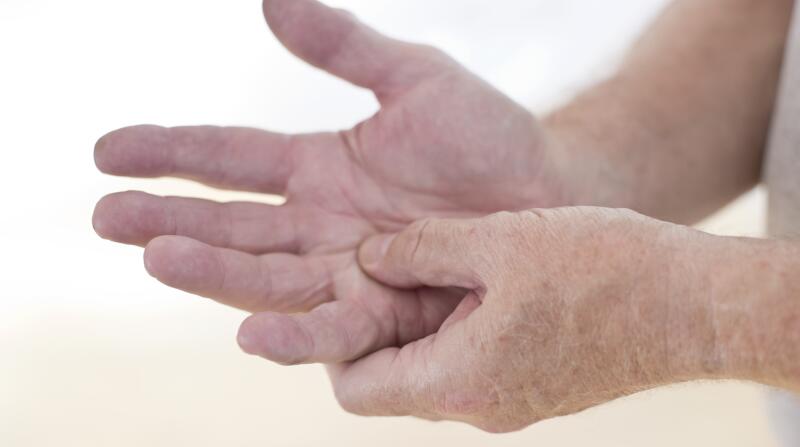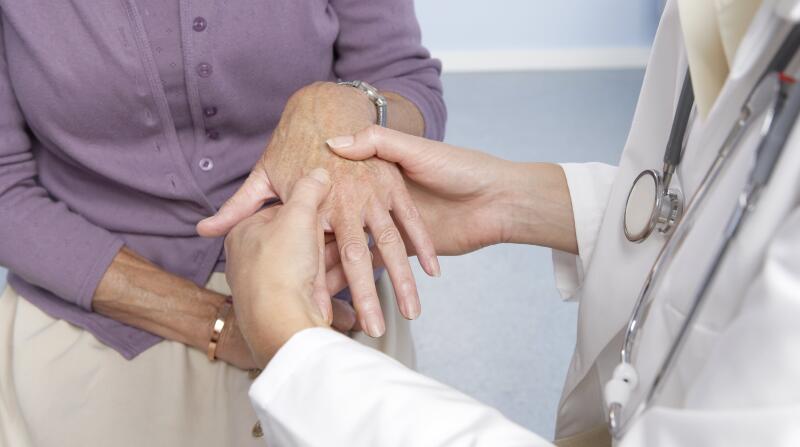Dupuytren's Contracture: 10 Things Doctors Want You to Know

Medically Reviewed By William C. Lloyd III, MD, FACS
Written By Lorna Collier on March 6, 2021
-
 Dupuytren’s Contracture Doctors Weigh In on the Relatively Unknown ConditionAbout 10 million Americans have a condition that can cause their fingers to bend and curl into their palms. Dupuytren (DOOP-uh-tren) disease—named after a 19th-century physician—is a chronic, oftentimes debilitating genetic illness that targets a thin layer of skin in the palm of the hand, called the fascia. As the illness progresses, the fascia becomes so damaged it causes one or more fingers to contract, or pull inward in a claw-like fashion. This stage is called Dupuytren's contracture. Learn what three hand surgeons say about Dupuytren disease—an often-misunderstood condition that affects 3% of Americans.
Dupuytren’s Contracture Doctors Weigh In on the Relatively Unknown ConditionAbout 10 million Americans have a condition that can cause their fingers to bend and curl into their palms. Dupuytren (DOOP-uh-tren) disease—named after a 19th-century physician—is a chronic, oftentimes debilitating genetic illness that targets a thin layer of skin in the palm of the hand, called the fascia. As the illness progresses, the fascia becomes so damaged it causes one or more fingers to contract, or pull inward in a claw-like fashion. This stage is called Dupuytren's contracture. Learn what three hand surgeons say about Dupuytren disease—an often-misunderstood condition that affects 3% of Americans. -
 1. “Dupuytren’s contracture can have a big impact on your daily life.”Dupuytren's contracture typically hits the ring finger first, with the pinky finger a close second, says Dr. Keith Raskin, a hand surgeon in private practice in Manhattan. As it advances, "there's a host of problems that could occur," says Dr. Raskin, including being unable to type, put on gloves or "wash your face without poking yourself in the eye." Musicians can't play their instruments, while grandparents are afraid to hold their grandbabies, adds Dr. Gary Pess, a hand surgeon who practices in New Jersey. "Even just clapping or shaking hands" becomes difficult, Dr. Pess says.
1. “Dupuytren’s contracture can have a big impact on your daily life.”Dupuytren's contracture typically hits the ring finger first, with the pinky finger a close second, says Dr. Keith Raskin, a hand surgeon in private practice in Manhattan. As it advances, "there's a host of problems that could occur," says Dr. Raskin, including being unable to type, put on gloves or "wash your face without poking yourself in the eye." Musicians can't play their instruments, while grandparents are afraid to hold their grandbabies, adds Dr. Gary Pess, a hand surgeon who practices in New Jersey. "Even just clapping or shaking hands" becomes difficult, Dr. Pess says. -
-
 2. “Some people never get bent fingers.”"If you look at everyone with Dupuytren disease, the majority—probably 80% have no bent fingers," says Dr. Charles Eaton, a Florida hand surgeon who founded and directs the Dupuytren Research Group. Many people are in the early stages of the disease, which causes puckered skin or lumps (called nodules) in the palm, says Dr. Eaton. Some of these patients may stay indefinitely in this early stage, without it converting to Dupuytren's contracture. "There are a host of patients who will have a single nodule in their palm and it may not progress to anything substantial at all," says Dr. Raskin.
2. “Some people never get bent fingers.”"If you look at everyone with Dupuytren disease, the majority—probably 80% have no bent fingers," says Dr. Charles Eaton, a Florida hand surgeon who founded and directs the Dupuytren Research Group. Many people are in the early stages of the disease, which causes puckered skin or lumps (called nodules) in the palm, says Dr. Eaton. Some of these patients may stay indefinitely in this early stage, without it converting to Dupuytren's contracture. "There are a host of patients who will have a single nodule in their palm and it may not progress to anything substantial at all," says Dr. Raskin. -
 3. “You can monitor your disease with the ‘table-top test.’”One way to see if your early stage Dupuytren disease is progressing to Dupuytren's contracture is to do a simple test between doctor's visits, says Dr. Raskin. "When you're at home or in the office, put your hand flat on the table and try to see if your hand is full contact," he says. Is the palm staying snug to the table? Or can you slide a piece of paper or the end of a pencil under it? "If the palm is no longer contacting the flat surface, that's a sign that it's become progressive," says Dr. Raskin. That means you need to contact your doctor. Dr. Raskin suggests doing this test every several months.
3. “You can monitor your disease with the ‘table-top test.’”One way to see if your early stage Dupuytren disease is progressing to Dupuytren's contracture is to do a simple test between doctor's visits, says Dr. Raskin. "When you're at home or in the office, put your hand flat on the table and try to see if your hand is full contact," he says. Is the palm staying snug to the table? Or can you slide a piece of paper or the end of a pencil under it? "If the palm is no longer contacting the flat surface, that's a sign that it's become progressive," says Dr. Raskin. That means you need to contact your doctor. Dr. Raskin suggests doing this test every several months. -
 4. “Be aware of your risk factors for Dupuytren disease.”"The single biggest risk factor for developing Dupuytren disease is having a close family member—a parent or sibling—with the disease," says Dr. Eaton. That's because the disease is genetic (though the appearance of symptoms may seem to ‘skip’ a generation). The disease is also more common in Caucasian people and in men, says Dr. Eaton. However, Dupuytren can strike both genders and can affect people of other racial and ethnic backgrounds as well. There's also a slight increase in risk for heavy smokers, heavy drinkers, and people who do heavy manual labor, says Dr Eaton.
4. “Be aware of your risk factors for Dupuytren disease.”"The single biggest risk factor for developing Dupuytren disease is having a close family member—a parent or sibling—with the disease," says Dr. Eaton. That's because the disease is genetic (though the appearance of symptoms may seem to ‘skip’ a generation). The disease is also more common in Caucasian people and in men, says Dr. Eaton. However, Dupuytren can strike both genders and can affect people of other racial and ethnic backgrounds as well. There's also a slight increase in risk for heavy smokers, heavy drinkers, and people who do heavy manual labor, says Dr Eaton. -
 5. “You may experience pain with early Dupuytren disease.”"Dupuytren is often described as a painless problem," says Dr. Eaton. "Yet it's not." About 25% of people with early Dupuytren disease experience pain or discomfort, says Dr. Eaton. This happens in the early stages, before bent fingers occur. "Before they have Dupuytren's contractures, they'll have tenderness or burning or itching or stinging in the areas involved," such as the palm of the hand, Dr. Eaton says. Some people will develop "weird itching in their palm" so severe that it keeps them up at night, he says, while others have such painful palms that they'll have trouble gripping things.
5. “You may experience pain with early Dupuytren disease.”"Dupuytren is often described as a painless problem," says Dr. Eaton. "Yet it's not." About 25% of people with early Dupuytren disease experience pain or discomfort, says Dr. Eaton. This happens in the early stages, before bent fingers occur. "Before they have Dupuytren's contractures, they'll have tenderness or burning or itching or stinging in the areas involved," such as the palm of the hand, Dr. Eaton says. Some people will develop "weird itching in their palm" so severe that it keeps them up at night, he says, while others have such painful palms that they'll have trouble gripping things. -
-
 6. “Having Dupuytren disease can put you at risk for other illnesses.”Dupuytren disease is associated with several other conditions: frozen shoulder, Ledderhose disease (which causes thickened fascia and lumps on the bottom of your feet) and, in men, Peyronie's disease (which affects the penis), says Dr. Eaton. "If you have Dupuytren, you are more likely to get one of these conditions, and vice versa," he says. Also, people with aggressive Dupuytren disease are more likely to have "a variety of different kinds of cancer," says Dr. Eaton, including kidney and gastrointestinal cancers. "They're more likely to have shortened lifespans."
6. “Having Dupuytren disease can put you at risk for other illnesses.”Dupuytren disease is associated with several other conditions: frozen shoulder, Ledderhose disease (which causes thickened fascia and lumps on the bottom of your feet) and, in men, Peyronie's disease (which affects the penis), says Dr. Eaton. "If you have Dupuytren, you are more likely to get one of these conditions, and vice versa," he says. Also, people with aggressive Dupuytren disease are more likely to have "a variety of different kinds of cancer," says Dr. Eaton, including kidney and gastrointestinal cancers. "They're more likely to have shortened lifespans." -
 7. “No bent fingers? You can still be treated.”If you don't have contracture but your Dupuytren symptoms are bothering you, Dr. Pess recommends cortisone shots. "There is some good quality data suggesting that injecting the nodules with cortisone slows down" the process that causes the contracture, he says. Dr. Pess has his patients come in every 3 to 6 months for these shots. Also, for people who have multiple family members with Dupuytren (suggesting an aggressive form of the disease), low-dose radiation therapy can be given, he says. Other measures, like diet, supplements and exercise, haven’t been proven to help, says Dr. Eaton.
7. “No bent fingers? You can still be treated.”If you don't have contracture but your Dupuytren symptoms are bothering you, Dr. Pess recommends cortisone shots. "There is some good quality data suggesting that injecting the nodules with cortisone slows down" the process that causes the contracture, he says. Dr. Pess has his patients come in every 3 to 6 months for these shots. Also, for people who have multiple family members with Dupuytren (suggesting an aggressive form of the disease), low-dose radiation therapy can be given, he says. Other measures, like diet, supplements and exercise, haven’t been proven to help, says Dr. Eaton. -
 8. “Dupuytren’s contracture surgery can help, not heal.”Dupuytren's contracture can be treated with surgery (fasciectomy) or minimally invasive procedures to break up the diseased fascia. But none of these will remove your Dupuytren disease, says Dr. Eaton. No matter what treatment you get, "the elephant in the room is that we don't have a cure," says Dr. Eaton. "After the procedure, the person still has Dupuytren disease and so recurrence is a common thing." The amount of time it takes for Dupuytren's contracture to return varies widely, but is inevitable. "We really need research to find a cure and to find better treatments," says Dr. Pess.
8. “Dupuytren’s contracture surgery can help, not heal.”Dupuytren's contracture can be treated with surgery (fasciectomy) or minimally invasive procedures to break up the diseased fascia. But none of these will remove your Dupuytren disease, says Dr. Eaton. No matter what treatment you get, "the elephant in the room is that we don't have a cure," says Dr. Eaton. "After the procedure, the person still has Dupuytren disease and so recurrence is a common thing." The amount of time it takes for Dupuytren's contracture to return varies widely, but is inevitable. "We really need research to find a cure and to find better treatments," says Dr. Pess. -
 9. “Don’t wait too long to have Dupuytren’s contracture procedures.”Dupuytren's contracture patients need to know “there's a window of time to get the best result" from surgery or other procedures, says Dr. Eaton. Doctors want to treat you when your finger joint is bent between 20 and 40 degrees. If you wait until your finger is bent more severely, Dr. Eaton says, you can still be treated—but "the chance of having a straight finger afterward goes down." (As a point of reference, a finger pointed straight down is at 90 degrees.)
9. “Don’t wait too long to have Dupuytren’s contracture procedures.”Dupuytren's contracture patients need to know “there's a window of time to get the best result" from surgery or other procedures, says Dr. Eaton. Doctors want to treat you when your finger joint is bent between 20 and 40 degrees. If you wait until your finger is bent more severely, Dr. Eaton says, you can still be treated—but "the chance of having a straight finger afterward goes down." (As a point of reference, a finger pointed straight down is at 90 degrees.) -
 10. “Seek out a hand surgeon as soon as you have symptoms.”Hand specialists can be difficult to find in some areas of the country, says Dr. Pess. But it's important to find someone with expertise in Dupuytren, even in the early stages, he says. Non-specialists may treat your Dupuytren symptoms incorrectly, says Dr. Pess. Or they may misdiagnose Dupuytren as arthritis or other ailments, says Dr. Raskin. "It's commonly misdiagnosed, which is unfortunate because then people live with this" —often not getting the early treatment that could help them. Dr. Pess recommends finding a Dupuytren surgeon through the American Society for Surgery of the Hand (www.findahandsurgeon.com).
10. “Seek out a hand surgeon as soon as you have symptoms.”Hand specialists can be difficult to find in some areas of the country, says Dr. Pess. But it's important to find someone with expertise in Dupuytren, even in the early stages, he says. Non-specialists may treat your Dupuytren symptoms incorrectly, says Dr. Pess. Or they may misdiagnose Dupuytren as arthritis or other ailments, says Dr. Raskin. "It's commonly misdiagnosed, which is unfortunate because then people live with this" —often not getting the early treatment that could help them. Dr. Pess recommends finding a Dupuytren surgeon through the American Society for Surgery of the Hand (www.findahandsurgeon.com).
Dupuytren's Contracture: 10 Things Doctors Want You to Know























